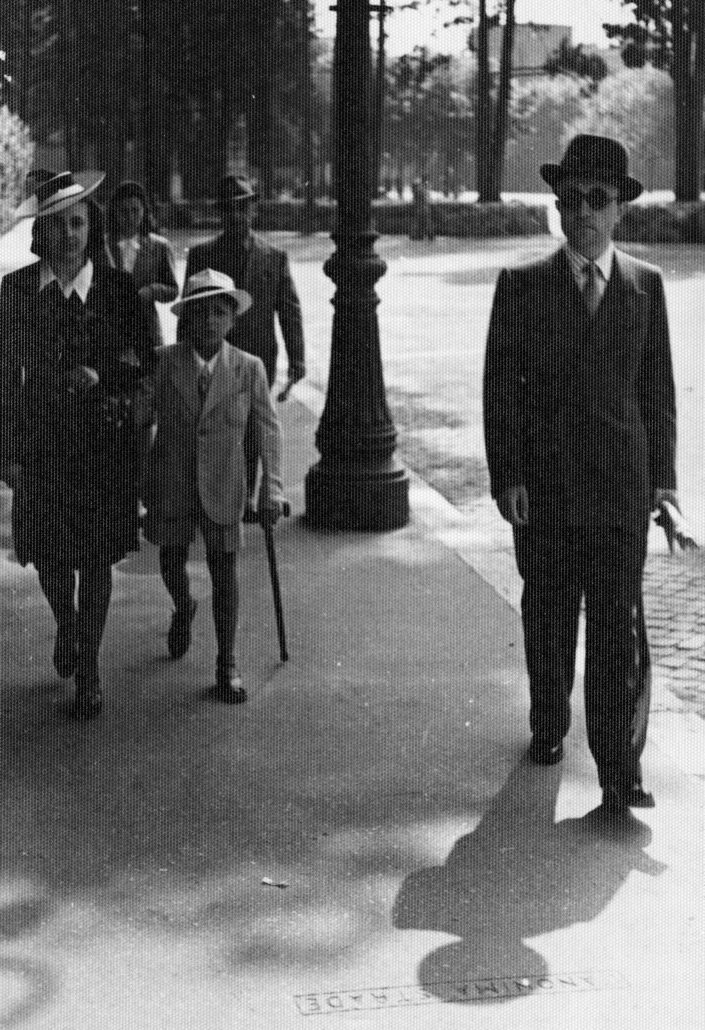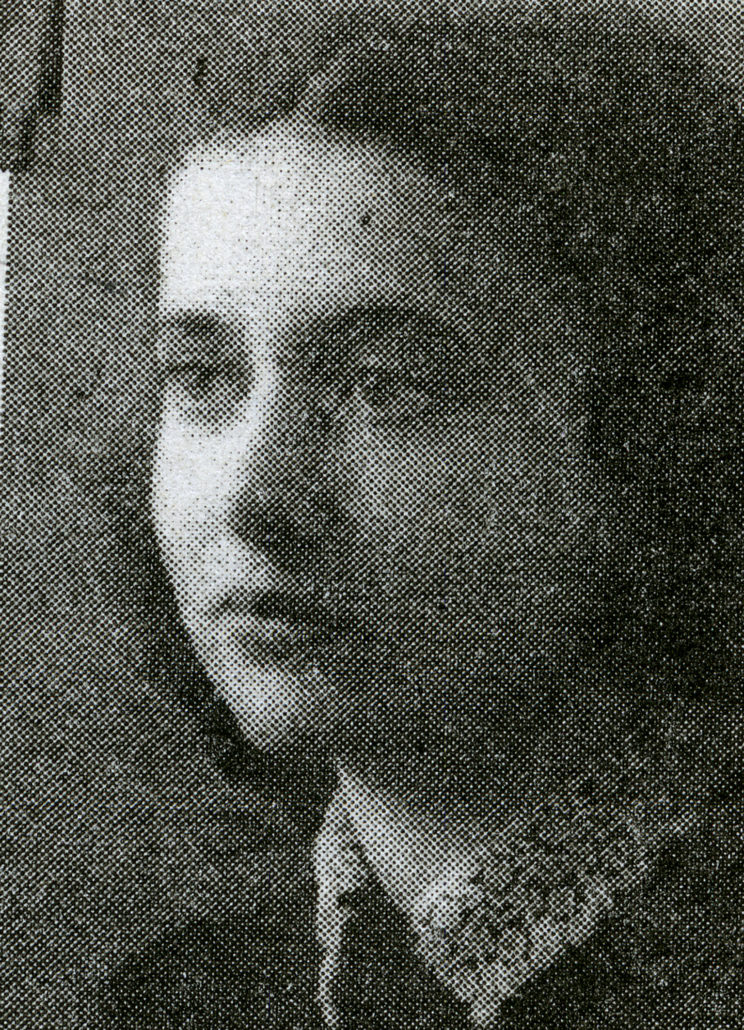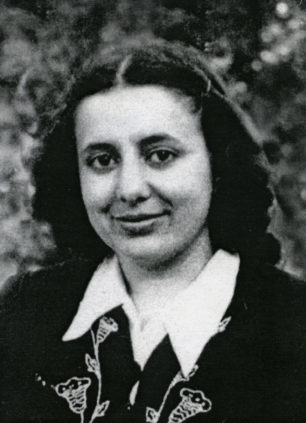Musine Kokalari

Musine Kokalari was born on 10 February 1917 in Adana, Turkey, within a patriotic and well-educated Albanian family from Gjirokastra. In 1920, her family returned to Gjirokastra. Being the youngest child in her family, Musine was raised with special care and love. From and early age, Musine showed a distinctive passion for literature in general and for the national folklore in particular. “Venus” library, which was owned by her brother Vesim Kokalari, played and important role in cultivating Musine’s passion for literature. During the 1930-1937 Musine continued her education in Tirana, at first at “Qiriazi” institute and then, at “Nëna Mbretëreshë”.
In 1937, a number of her articles on social issues were published in the “Shtypi” newspaper under the nickname “Muza” (“the Muse”). In 1938, Musine Kokalari starts her higher educational studies abroad, at the Faculty of Modern Literature at “La Sapienza” University in Rome. In 1939, Musine Kokalari wrote her first professional work titled “Siç më thotë nënua plakë” (“As my Granma says”). This work was published around 1941 in Tirana as a collection of ten original prose tales mainly inspired from popular culture and folkloric roots of the region of Gjirokastra and composed in the Tosk dialect. At the center of this work stands the figure of the woman from Gjirokastra and her day-to-day struggles within a deep patriarchal society. “Siç më thotë nënua plakë” is considered as the first literary work written by a female in the history of the Albanian nation.
Also, in 1940, Musine published an Italian-Albanian linguistic dictionary. Unfortunately, this dictionary has not been found and thus has not been republished. During 1940-1942, Musine Kokalari documents her feelings and impressions experienced during her studies in a foreign country that was under the fascist regime. These documentations were written in the form of a personal diary in the Italian language called originally “La Mia Vita Universitaria” (“My university life”). Musine, intended to publish this genuine work first in Italy, in the Italian language. However, she did not have the opportunity to realize this ambition during her lifetime. In early 1942, Musine graduates from the university with distinguished remarks after four years filled with studies and research work.
Starting from the early 1942, Musine Kokalari joined the antifascist and anticommunist movements in Rome and with the same views returns to Albania. With an expanded and enriched vision she locates in Tirana where she engages in a series of initiatives in writing and publishing. Also, during 1942, the name of Musine Kokalari is included in the Italian encyclopedia as a talented writer with a high creative potential. As part of the antifascist movement in Albania, she contributes in the publishing of the magazine titled “Gruaja Shqiptare” (The Albanian Woman) in June 1943, under the nickname “Tacitta”. In the same year, Musine Kokalari co-founds the political entity called “Partia Social Demokrate e Shqipërisë” (“The Albanian Social Democratic Party”). She was the main voice and inspiring figure within the party. In addition to this political project, on 1 January 1944, Musine Kokalari along with Prof. Isuf Luzi published the first issue of the newspaper named “Zëri i Lirisë” (“The voice of Freedom”). “Zëri i Lirisë” served as the official newspaper of the newly formed Social Democratic Party.


At this time her activity, as a defender of democratic and patriotic ideals, is concentrated around “Venus” library that was owned by her brothers. This library was soon turned into a meeting center for various intellectuals and enthusiasts of literature and politics who shared the same progressive views as Musine. Throughout 1944, Musine Kokalari wrote a significant amount of linguistic studies. During the same year, through the Publishing House “Mesagjeritë Shqiptare”, that was also owned by her brothers, Musine published her own two books titled “Rreth Vatrës” (“Around the Hearth”) and “Sa u tunt jeta” (“How life swayed”). These works, composed as a collection of short stories or as folksy tales, were publicly recognized and endorsed from various writers in Albania and abroad. At the same time, the author continued her work in the field of folkloric studies by collecting a substantial amount of legends and fairy tales from many Albanian cities and regions notably from Gjirokastra, Tepelena, Vlora, Elbasani, Korça, Shkodra, and Shkupi.
Unfortunately, this productive time of literary work from Musine Kokalari was stopped from a tragic period affecting individual and social spheres across Albania. The communist forces in Albania would seek to diminish the contribution and efforts against the Italian and German invaders made by other non-communist Albanian groups. Coercive force was used against many intellectuals who did not share the communists’ view on proper governing. The communists were now eager to attain governing power after the end of the Second World War. Everywhere across Albania, massacres were carried out from communists against various intellectuals, individuals who opposed them and other organized patriotic groups. This time marks a tragedy of its own in the life of Musine Kokalari. On 12 November 1944, the communist forces executed two of her older brothers Vesim and Muntaz Kokalari. The youngest of the brothers, Hamit Kokalari was spared solely because he was severely sick.
Musine had already expressed her views against the implementation of a totalitarian regime after the end of the Second World War. This is evident in the statute of the Social Democratic Party compiled by Musine Kokalari herself and published in the first issue of the newspaper “Zëri i Lirisë” (“The voice of freedom”) mentioned above. In this statue, the democratic and freedom loving ideas expressed by the author are impressive. Some of the main progressive ideas expressed in the statute as political goals are as follows: establishment and protection of social and political justice; encouragement of a free market; establishment of an appropriate property reform that helps all members of the society; formation of political freedom through guaranteeing freedom of speech, thought, private enterprise, and voting; establishment of productive international relations while preserving solid patriotic values; protection of Albanian ethnic border from foreign military threats. Because of political views, which diverged from the intentions of the communists for the establishment of a dictatorial regime, Musine Kokalari was arrested two times from 13 to 28 November 1945. During the same month, she gets involved into a political and intellectual movement that she referred to as the “Democratic Coalition”. This coalition represented political groupings from the opposition that aimed to postpone the elections of December 2nd. On the 2nd of December, only the communist party was allowed to participate. All the candidates or platforms coming from parties or movement contrary to the communist views were prohibited.


Within the “Democratic Coalition”, Musine was the only representative of the Albanian Social Democratic Party. At the same time, she was the main active figure within this coalition. Thus, based solely on her efforts, she writes an official note that described the demands of the opposition parties regarding the postponement of the elections of December 2nd . Through this note was also demanded the selection of a more appropriate date for organizing a parliamentary election process where many and various political forces would be allowed to participate. Had it been realized, this would have marked the first truly pluralistic election in the history of Albania. On the same note, it was requested that representatives from the international community and especially representatives from the governments of the United Kingdom and the United States of America should guarantee and monitor the freedom and pluralistic element of such election. For this purpose, the note was sent to the representatives of the aforementioned countries. Unfortunately for all the Albanian society, the project of the “Democratic Coalition” was never realized. During January of 1946, all the signing members of the note were arrested. Musine Kokalari herself was arrested on 23 January 1946 and had to endure prolonged tortures without giving up on her convictions in favor of a multi-party system and a free society.
On 2nd June 1946, Musine Kokalari was judged from supporters of communism in a disgraceful and shameful court process. Despite the threats and intimidation techniques exercised by communists on her, she never rejected her view on the importance of a multi party election. Musine was bold enough to restate her views even in the courtroom during the very short time she was able to speak. The stoic stance of Musine Kokalari during this process is illustrated by a photo of her taken in the courtroom by the Albanian telegraphic agency. Regarded as a threat to the dictatorship, Musine Kokalari was sentenced with 35 years of imprisonment (of which she spent 16 years in jail) and lifetime prosecution.


During prison time, she endured other continuous forms of torture without sacrificing her progressive ideas and morals. In 1962, she was transferred from the prison facilities to Rrëshen where she engaged in hard construction works in tough conditions, under the strict surveillance of the state security agents. The continuous persecution and lack of basic conditions affected directly into Musine’s writing, which was brutally interrupted. After many years of suffering, in 1972 Musine was able to finish in secrecy her book titled “Si lindi Partia Social Demokrate” (“How the Social Democratic Party was born”). In this book she maintains the same anti-communist views and explains her progressive democratic alternative. She succeeded in secretly preserving this work by sending it to her nephew Platon Kokalari as part of a collection of writings under the subject “Të shpëtojmë sa të mundim nga vlerat morale” (“Lets save our moral values as much as we can.”). Musine Kokalari was diagnosed with cancer in 1980 but was refused the proper treatment and care from the personnel of the hospital. Left untreated and therefore uncured, under considerable pain, while also carrying the sufferings endured during the persecution, Musine Kokalari died in August 1983. The full isolation imposed on her during the years of persecution denied Albanians many qualitative literary works that, in other more favorable conditions, would have been created and published by Musine Kokalari. The figure of Musine Kokalari represents the first Albanian woman dissident.
